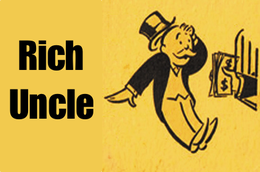
Rich uncle, IPO shares, lottery, how will you act if a windfall comes your way? How nice would it be to quit worrying about managing your finances. Think again. Any type of a 'payout' is going to take some financial management on your part.
Start by taking a least 90 days before making any substantial purchases. Put the funds in a safe spot like a money market fund. This will give you some time to finalize your investment strategy and think about assembling your team of professionals. No matter how much advance thinking you have done, once the payout arrives, take the 90 days.
Start by taking a least 90 days before making any substantial purchases. Put the funds in a safe spot like a money market fund. This will give you some time to finalize your investment strategy and think about assembling your team of professionals. No matter how much advance thinking you have done, once the payout arrives, take the 90 days.

Make sure you review the tax implications thoroughly.
Get an estimate of taxes owed as soon as you can. Do this well in advance of tax time. Be aware that you may also be responsible for paying estimated taxes for the year in which the funds are received.
- While inheritances and other gifts generally escape federal income taxes, funds from other sources such as the sale of short-term property, lottery winnings or a legal settlement may be taxed as ordinary income at up to a 39.6% federal rate.
- Other income, such as the sale of a business, real estate or stocks, may be taxed at the lower long-term capital gains rate.
- Equity compensation, including proceeds from an initial public offering, may be taxed as ordinary income, or receive favorable tax treatment, depending on how it’s structured.
- You may owe additional state taxes as well; these vary depending on the state and your circumstances.
Get an estimate of taxes owed as soon as you can. Do this well in advance of tax time. Be aware that you may also be responsible for paying estimated taxes for the year in which the funds are received.

Depending on where you are in your investing life, chances are that your focus has been on building wealth. With that little extra inflow, your focus may change to wealth preservation to safe guard against dramatic market fluctuations. You may want to incorporate a little safety into your holdings. Municipal bonds may help to reduce future tax bills. Once you have it, your view of risk may change. Once you have it, you'll want to keep it.

Let your family members share in your good fortune. Think about education for everyone close to you. You’ll want to revisit (or create) your gift and estate plan to make sure you’re giving smartly.
A donor-advised fund, for example, allows you to gift a large chunk of assets to qualified charities, and reap an immediate tax benefit. You can then decide how you want to allocate the donated money over time.
Alternatively, a private foundation offers more flexibility in how the money is managed and donated, but also requires more paperwork. Speak to your estate planning attorney about the pros and cons of these and other charitable vehicles, as well as the best way to make gifts to family members or other individuals, if you’re so inclined.
A donor-advised fund, for example, allows you to gift a large chunk of assets to qualified charities, and reap an immediate tax benefit. You can then decide how you want to allocate the donated money over time.
Alternatively, a private foundation offers more flexibility in how the money is managed and donated, but also requires more paperwork. Speak to your estate planning attorney about the pros and cons of these and other charitable vehicles, as well as the best way to make gifts to family members or other individuals, if you’re so inclined.

The purpose of life insurance is to support your family should you pass away during your working years; however, if you’ve got plenty in the bank now, you may no longer need to pay those premiums. Should you buy a nicer car or home thanks to your windfall, you’ll also want to review and update your property and casualty policy.
Finally, consider an extra layer of protection: Your newfound assets could make you a financial target in the event of a lawsuit. An extra liability policy, known as an umbrella policy, covers personal liabilities above the typical limits on home and auto insurance policies.
Finally, consider an extra layer of protection: Your newfound assets could make you a financial target in the event of a lawsuit. An extra liability policy, known as an umbrella policy, covers personal liabilities above the typical limits on home and auto insurance policies.

Ditching costly consumer debt (such as credit card debt) is a no-brainer. You may also want to repay student loans that offer little tax benefit. You may even be tempted to wipe out your mortgage, but that may not be the best financial move, particularly if you’ve refinanced during the recent stretch of ultra-low interest rates.
A primary home loan at a 3.5% rate is equivalent to about 2.3% after taxes if your combined federal and state income tax bracket is 35% and you’re able to deduct all the interest expense. There’s a good chance you could get a higher rate of return by investing the money elsewhere. That said, don’t forget about risk. Paying off a loan is the same as earning a risk-free return equal to the cost of the money.
Once you’ve taken care of the practicalities you can think about how the money might help you fund important life and career goals—a project you want to launch, for example, or the chance to explore a new direction for your retirement. Those may be the true luxuries that a windfall affords.
A primary home loan at a 3.5% rate is equivalent to about 2.3% after taxes if your combined federal and state income tax bracket is 35% and you’re able to deduct all the interest expense. There’s a good chance you could get a higher rate of return by investing the money elsewhere. That said, don’t forget about risk. Paying off a loan is the same as earning a risk-free return equal to the cost of the money.
Once you’ve taken care of the practicalities you can think about how the money might help you fund important life and career goals—a project you want to launch, for example, or the chance to explore a new direction for your retirement. Those may be the true luxuries that a windfall affords.

Once you've made some initial decisions and set aside money needed to pay taxes, consider spending a small portion of your windfall on something you'd like. There's no reason to deprive yourself, as long as you've taken care of business first. If you plan well and control the urge to spend lavishly, your windfall may provide you with financial security and comfort for many years to come.
Keep you integrity and character, it got you to this point. Be yourself, help others.
Keep you integrity and character, it got you to this point. Be yourself, help others.
Bradford C. Bruner for Sua Sponte Wealth Management

















































